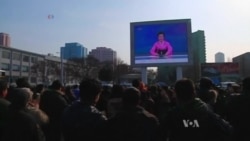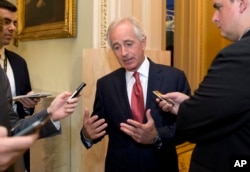North Korea needs to end “provocations” and “choose a better path,” said U.S. Secretary of State John Kerry, in reaction to what Pyongyang says was a successful test of a hydrogen bomb Wednesday.
“We do not and will not accept North Korea as a nuclear armed state,” said Kerry in a statement. He added that he has been consulting with his foreign counterparts on the situation.
The White House and analysts have cast doubt on North Korea’s claim that its test actually involved a hydrogen bomb. However, there is broad concern about what appears to be the fourth nuclear test by North Korea since 2006.
Seeking broader response
There had been calls for stepped up U.S. action against North Korea even before this latest incident.
Lawmakers introduced the North Korea Sanctions Enforcement Act. That measure, which has bipartisan support, would close gaps in existing U.S. sanctions against North Korea and freeze the assets of North Korean leader Kim Jong Un. The measure has cleared the House but has languished in the Senate.
House Foreign Affairs Committee Chairman Ed Royce is the author of the measure. “The answer to North Korea’s threat is more pressure, not less,” said Royce in a statement.
Senate Foreign Relations Committee chairman Bob Corker urged the Obama administration to step up action against North Korea. “The past several decades of U.S. policy toward North Korea has been an abject failure,” said Corker.
Mixed views on US response
Analysts have mixed views about whether the U.S. policy toward Pyongyang has been effective and whether additional U.S. action is needed against North Korea.
The past two U.S. administrations have had a “fairly passive policy” on North Korea, said Joshua Stanton, a Washington attorney and blogger who helped draft House legislation on sanctions against North Korea.
“As President Obama came in [to office],” said Stanton, he was “inclined to take a more permissive approach to engage North Korea.”
He said a U.S. effort to step up engagement has resulted in a weakening of U.S. sanctions.
“The sanctions that we have against North Korea are weaker today than our sanctions against Zimbabwe or Belarus and, in some regards, weaker than our sanctions against Burundi,” he said.
However, Stimson Center co-founder Barry Blechman said the U.S. has been placing sufficient economic pressure on North Korea.
“We have sanctions on just about everything that we can. I think that we and other nations are quite diligent in enforcing the sanction,” he said.
Possible North Korea Nuclear Test
Possible North Korea Nuclear Test
Where: The Punggye-ri Nuclear Test Facility, North Korea’s only nuclear test site, located in mountainous terrain in the northeast of the country; has three visible tunnel entrances known as the South Portal, East Portal, and West Portal.
Previous tests: 2006, 2009 and 2013; all at Punggye-ri
Alert: Suspicions of a possible nuclear test were first raised by seismologists who detected a 5.1 magnitude tremor near Punggye-ri. The U.S. Geological Survey said the epicenter of the quake, detected at 10 a.m. Pyongyang time (0130 GMT), was about 50 kilometers (30 miles) northwest of Kilju city, placing it next to the Punggye-ri nuclear test site.
No confirmation: The White House said it could not confirm the North Korean test.
Sources: The Nuclear Threat Initiative, AFP
Calls for China to use leverage on North Korea
Blechman said the U.S. and its allies needed to exert pressure on China, North Korea’s key regional ally, to end what he called Beijing’s “lax” approach to enforcing international sanctions against China.
“They permit considerable trade to go on,” said Blechman. “It would be helpful if China would tighten its noose around North Korea’s economy.”
Atlantic Council analyst Robert Manning said China likely views North Korea’s latest test as a “huge kick in the teeth,” considering it has come at a time when Beijing has been trying to repair frayed relations with Pyongyang.
“This was a huge humiliation and that is something the Chinese don’t tolerate, particularly from a small country,” said Manning.
He said China should consider action that incudes cutting oil supplies to North Korea.
China has condemned North Korea’s latest test. It also backed U.N. sanctions after North Korea conducted a third nuclear test in 2013.
North Korea’s new test may have hurt China’s security interests, said Yang Xiyu, an analyst at the China Institute of International Studies.
“China has been pursuing two goals in the Korean peninsula,” said the former Chinese diplomat. He said those goals are denuclearization and stability through “peace building.”
Broader implications from test
Blechman said any U.N. response should go beyond specifically sanctioning North Korea for its latest test.
He said the U.N. should deem a nuclear test – by any nation – a threat to international security, a move that he said would open the door to a stronger international response. He also expressed concern that other countries could be emboldened by North Korea’s actions.
“It could lead other countries, like India and Pakistan for example, who might see technical reasons to want to test their weapons to begin resuming testing,” he said.
Stanton said what the U.S. and other world powers need now is “leverage” against North Korea.
He said that would involve getting South Korea, Japan, the U.S. and the European Union “on the same page” in enforcing existing U.N. Security Council sanctions against Pyongyang.













